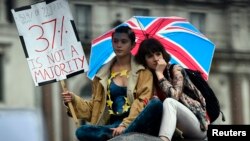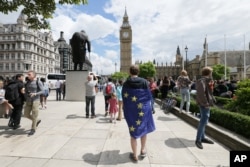The routines are still followed. They are still changing the guard at Buckingham Palace. Even the weather of a traditional British summer can be depended on, low-hanging gray rain clouds drizzling periodically.
And post-Brexit, people still avoid talking to each other on London’s famous Underground, willing only to exchange polite meaningless words, if really pushed.
But for all the outward sameness, few Britons doubt Brexit has changed everything. Even ardent Leave voters acknowledge the going will be rough and that Britain could be in the economic doldrums for a decade or more, but they insist the trade-off will be worth it.
Others dig deep into history invoking Spitfires and the Battle of Britain or even cite a mythical past of the Knights of the Round Table and the wizard Merlin.
“We were great once and can be great again,” insists Bill, a store manager. Although he insists he didn’t vote to exit the EU because of the issue of immigration, he says, “Britain was losing its Britishness.”
Some still hold out hope the referendum result can be reversed or modified with a helping hand from Europeans, who they think might be persuaded to renegotiate the terms of a deal struck in February to keep Britain in the bloc.
The European Commission President Jean-Claude Juncker ruled that out on Tuesday in a speech in the European Parliament.
But former British prime minister Tony Blair says Britain shouldn’t be written out of Europe yet, arguing, “I wouldn’t rule anything out.”
Political Parties Head for Showdown
Aside from the implosion of both main political parties, the Conservatives and Labour are heading for divisive leadership contests.
The political spectacle of the past few days has been one of politicians promoting ever more devious, some critics argue impractical, ways of reversing the Brexit referendum or striking a deal that will see Britain as an EU partner enjoying close ties with the bloc, but without freedom of labor movement.
The ideas include: having a re-run referendum or a second referendum on any terms agreed later between the EU and Britain for a free trade deal.
Advocates point to Ireland’s two referendums on an EU treaty, which saw the country vote against the Lisbon Treaty in 2008 and then back it 16 months later.
Others wanting to reverse the Brexit referendum are putting faith in having an early general election later this year, once the Conservatives and Labour have concluded their leadership contests, hoping the election will wipe out the referendum result. They argue the issues facing the country are so great a new parliamentary mandate is needed.
But an early election would place the Conservatives at a disadvantage. What platform would the party run on? A majority of Conservative lawmakers are opposed to Brexit, but the party’s leading contender to be the next leader, Boris Johnson, a darling of Conservatives outside parliament, was one of the chief Leave campaigners.
Johnson has said that if he does replace Prime Minister David Cameron, he would not hold an early election.
His chief rival, Theresa May, the tough interior secretary, campaigned for Remain, but has been silent publicly on whether she would want to hold an early election. It would be virtually impossible for her to take the party into an election campaigning for the reversal of a referendum the party previously promised to uphold, say commentators.
And it isn’t clear whether the anti-Brexit parties, Labour, which is in disarray, and the Liberal Democrats, could win an election.
Lame Duck Parliament
The political permutations and sense of alarm was on show Wednesday in Prime Minister’s Question Time in the House of Commons. Not through an open clash, but conveyed by how subdued it was for most of the occasion.
“It is as if we are holding our breath,” said Emily Thornberry, a Labour lawmaker.
“What is clear is this is a lame duck parliament. No decisions can be made,” she added. The Leave camp is not helping, she maintains.
“They now have control, but they have no idea what to do. They have taken us into this dark place, but don’t know how to take us out of it,” she said.
Conservative lawmaker, David Davis, a Brexit supporter, says people shouldn’t be in a rush for answers.
“What is happening now will define Britain for years to come and we need to take our time,” he said.
Time though isn’t just worrying EU leaders, who fear as the uncertainty prolongs markets will become more torrid and recession will quickly follow, but also many ordinary people and businesses.
“I came over to sign two software deals for $100 million each with UBS and Barclays banks,” says a Danish executive, who asked not to be named. “On Monday both banks pulled out of the deals, saying they might be moving operations and anyway are making no new investments. Everything is on hold.”
Outside London, nervousness is also apparent even in districts that backed Brexit.
In Sunderland in northeast England workers at the Nissan plant, Britain’s largest car-making site that opened 30 years ago, are now anxious about their jobs.
In 2015, 55 percent of the nearly half-a-million cars the plant produced were exported to other EU states. A full Brexit in two years time would likely force the company to shift at last half of its operations to other EU states and prompt plant lay-offs.
Bizarrely, many Nissan workers voted for Brexit, although local media outlets are now full of reports of workers saying, they now wonder why they did so.







